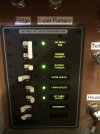Sharphooks
Well-Known Member
I have a pre-owned boat with way more bells and whistles then I’ll ever use. But I’d like to understand why some of this stuff is there and how to use it. One of those things is an inverter. I have no appliances or laptop chargers I want to operate on the boat. I only use shore-power to top off the batteries.....taking these requirements (or lack of requirements) into account, why is it recommended to always leave the inverter switch “on”?
And last question, do all inverters have a battery to store the AC charge or is that a special install?
And last question, do all inverters have a battery to store the AC charge or is that a special install?

